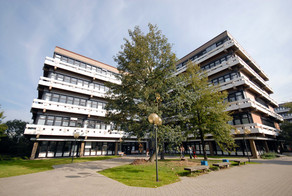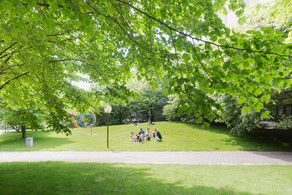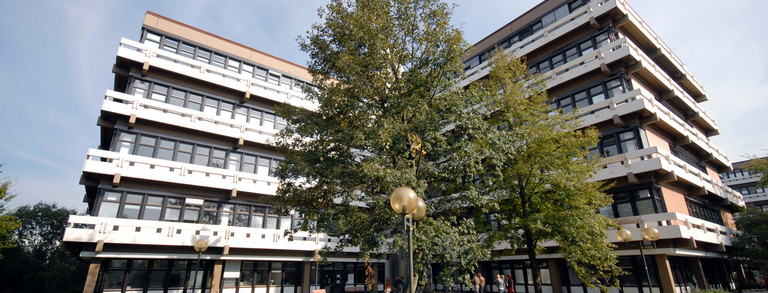Prof. Dr. Stephan Heinzel
ResearchGate: https://www.researchgate.net/profile/Stephan-Heinzel
Google Scholar: https://scholar.google.com/citations?user=zA1KUkgAAAAJ&hl=en
OSF: osf.io/vt8ca
Arbeitsschwerpunkte
- Neurobiologische Grundlagen psychischer Störungen (Depressionen, Angst- und Zwangsstörungen)
- Mechanismen therapeutischer Interventionen (Psychotherapie, Sport, kognitives Training)
- Prädikation der Inzidenz psychischer Störungen und des Behandlungserfolgs
- Klimakrise und psychische Gesundheit (Psychologie der Klimakrise, Klima-Angst, Klima-bewusstes Verhalten, Klima-Bildung)
Sprechzeiten
Im WiSe24/25 nach Vereinbarung
Weitere Informationen
seit 2023: Professor für Klinische und Biologische Psychologie
TU Dortmund
2016 - 2023: Juniorprofessur für Neurobiologische Mechanismen therapeutischer Interventionen
Freie Universität Berlin
2014 - 2016: Post-Doc (50%) in der Klinischen Psychologie
Humboldt-Universität zu Berlin
2013 - 2016: Post-Doc (50%) in der Sozial- und Präventivmedizin
Universität Potsdam
2014: Approbation zum Psychologischen Psychotherapeuten
(Vertiefungsverfahren Verhaltenstherapie)
2009 - 2014: Psychotherapie-Ausbildung am Zentrum für Psychotherapie
am Institut für Psychologie der Humboldt-Universität zu Berlin (ZPHU).
2013: Promotion zum Dr. rer. nat. in der Psychologie
Humboldt-Universität zu Berlin
2010 - 2013: Doktorand
Charité Berlin und Humboldt-Universität zu Berlin
2008: Diplom in Psychologie
Ludwig-Maximilians-Universität München
2005 - 2006: Studium der Psychologie
Macquarie University Sydney, Australien
2003 - 2008: Studium der Psychologie,
Ludwig-Maximilians-Universität München
ResearchGate: https://www.researchgate.net/profile/Stephan-Heinzel
Google Scholar: https://scholar.google.com/citations?user=zA1KUkgAAAAJ&hl=en
OSF: osf.io/vt8ca
Zeitschriftenartikel (peer-reviewed)
Publikationen in peer-reviewten Fachzeitschriften
2024/ in press:
Haucke, M. N., Heinz, A., Heinzel, S., & Liu, S. (in press). Investigating the Impact of COVID-19 Related Worries and Loneliness on Alcohol Consumption: An Ecological Momentary Assessment. European Archives of Psychiatry and Clinical Neuroscience. (IF 4.7)
Haucke, M., Heinzel, S., & Liu, S. (2024). Social mobile sensing and problematic alcohol consumption: Insights from smartphone metadata. International Journal of Medical Informatics, 188: 105486. https://doi.org/10.1016/j.ijmedinf.2024.105486 (IF 4.9)
Huang, C., Li, R., Heinzel, S., Zhao, M., & Liu S. (in press). The impact of video gaming, music, and social media on physical activities among adults in China and Germany. World Leisure Journal. https://doi.org/10.1080/16078055.2024.2377142 (IF 1.9)
Jüres, F., Kaufmann, C., Riesel, A., Grützmann, R., Heinzel, S., Elsner, B., Bey, K., Wagner, M., Kathmann, N., & Klawohn, J. (2024). Heart rate and heart rate variability in obsessive-compulsive disorder: Evidence from patients and unaffected first-degree relatives. Biological Psychology, 189: 108786. https://doi.org/10.1016/j.biopsycho.2024.108786. (IF 3.3)
Keller, J., Eichinger, M., Bechtoldt, M., Liu, S., Neuber, M., Peter, F., Pohle, C., Reese, G., Schäfer, F., & Heinzel, S. (2024). Evaluating the Public Climate School - a multi-component school-based program to promote climate awareness and action in students: A cluster-controlled pilot study. Climate Change and Health 15: 100286. https://doi.org/10.1016/j.joclim.2023.100286 (IF 2.7)
Kelly, S., Stielow, C., Heinzel, S., Heissel, A., & Meyer, J. (2024). Influences Of An Acute Exercise Bout On Insulin-like Growth Factor-1 In Major Depressive Disorder. Medicine and Science in Sports and Exercise 56(10S): 296-297. DOI: 10.1249/01.mss.0001055136.79571.f6 (IF 4.1)
Kelly, S., Meyer, J., Stielow, C., Heinzel, S., & Heissel, A. (2024). Effects of an Acute Maximal Exercise Bout on Serum Insulin-Like Growth Factor-1 in Adults with MDD. Psychoneuroendocrinology, 171: 107215. https://doi.org/10.1016/j.psyneuen.2024.107215 (IF 3.7)
Liu, S., Zhao, M., Li, R., Huang, C., Du, J., Schad, D. J., & Heinzel, S. (2024). A wandering mind reflects a lonely mind: a cross-cultural study. Current Research in Behavioral Sciences, 6, 2024, 100153. https://doi.org/10.1016/j.crbeha.2024.100153 (IF 6.6)
Mückstein, M., Görgen, K., Heinzel, S., Granacher, U., Rapp, M. A., & Stelzel, C. (in press). Multitasking practice eliminates modality-based interference by separating task representations in sensory brain regions. The Journal of Neuroscience, e0755242024. https://doi.org/10.1523/JNEUROSCI.0755-24.2024 (IF 5.3)
2023:
Golde, S., Ludwig, S., Lippoldt, S., Rimpel, J., Schulze, L., Renneberg, B., & Heinzel, S. (2023). Negative and positive self-beliefs in social anxiety: the strength of believing mediates the affective response. PloS ONE, 18 (3): e0281387. doi.org/10.1371/journal.pone.0281387. (IF 3.6)
Haucke, M., Heinzel, S.*, & Liu, S.* (2023). Involuntary social isolation and alcohol consumption: An ecological momentary assessment in Germany amid COVID-19. Alcohol and Alcoholism, 2023, agad069. https://doi.org/10.1093/alcalc/agad069 * equal contribution (IF 3.9)
Heinen, D., Heissel, A., Heinzel, S., Fydrich, T., Ströhle, A., Rapp, M.A., & Vogel, H. (2023). Effect of acute and long-term exercise on leptin levels in depressed outpatients. BMC Public Health 23(1): 2509 https://doi.org/10.1186/s12889-023-17362-4 (IF 4.5)
Heinzel, S., Tschorn, M., Schulte-Hutner, M., Schäfer, F., Reese, G., Pohle, C., Peter, F., Neuber, M., Liu, S., Keller, J., Eichinger, M., & Bechtoldt, M. (2023). Anxiety in response to the climate and environmental crises: Validation of the Hogg Eco-Anxiety Scale in Germany Frontiers in Psychology 14, 1239425. https://doi.org/10.3389/fpsyg.2023.1239425 (IF 4.2)
Lau, A., Li, R., Huang, C., Du, J., Heinzel, S., Zhao, M., & Liu, S. (2023). Self-esteem mediates the effects of loneliness on problematic alcohol use. International Journal of Mental Health and Addiction. [Epub ahead of print, March] https://doi.org/10.1007/s11469-023-01035-9 (IF 11.6)
Li, R., Liu, S., Huang, C., Darabi, D., Zhao, M., & Heinzel, S. (2023). The influence of perceived stress and income on mental health in China and Germany. Heliyon [Epub ahead of print]
doi.org/10.1016/j.heliyon.2023.e17344 (IF 3.8)
Liu, S., Li, R., Wegner, L., Huang, C., Haucke, M.N., Schad, D. S., Zhao, M., & Heinzel, S. (2023). High mind wandering correlates with high risk for problematic alcohol use in China and Germany. European Archives of Psychiatry and Clinical Neuroscience [Epub ahead of print]
doi.org/10.1007/s00406-023-01555-4 (IF 5.3)
Schwefel, M., Kaufmann, C., Gutmann, G., Henze, R., Fydrich, T., Rapp, M.A., Ströhle, A., Heissel, A., & Heinzel, S. (2023). Physical fitness is associated with neural activity during working memory performance in major depressive disorder“. NeuroImage: Clinical 38: 103401. https://doi.org/10.1016/j.nicl.2023.103401. (IF 4.9)
2022
Brahms, M., Heinzel, S., Rapp, M.A. Mückstein, M., Hortobágyi, T., Stelzel, C., & Granacher, U. (2022) The Acute Effects of Mental Fatigue on Balance Performance in Healthy Young and Older Adults – A Systematic Review and Meta-Analysis. Acta Psychologica, 225: 103540. [Epub ahead of print] doi.org/10.1016/j.actpsy.2022.103540 (IF 1.4)
Eichinger, M., Bechtoldt, M., Bui, I.T.M., Grund, J., Keller, J., Lau, A.G., … & Heinzel, S. (2022). Evaluating the Public Climate School - A School-Based Programme to Promote Climate Awareness and Action in Students: Protocol of a Cluster-Controlled Pilot Study. International Journal of Environmental Research and Public Health, 2022, 19, 8039. doi.org/10.3390/ijerph19138039 (IF 4.6)
Grützmann, R., Kathmann, N., & Heinzel, S. (2022). Effects of a Three-Week Executive Control Training on Adaptation to Task Difficulty and Emotional Interference. PLOS ONE 17 (11): e0276994. doi.org/10.1371/journal.pone.0276994. (IF 3.6)
Grützmann, R., Kaufmann, C., Wudarczyk, O., Balzus, L., Klawohn, J., … Heinzel S., & Kathmann, N. (2022). Error-Related Brain Activity in Patients with Obsessive-Compulsive Disorder and Unaffected First-Degree Relatives: Evidence for Protective Patterns. Biological Psychiatry: Global Open Science, 2(1): 79-87. https://doi.org/10.1016/j.bpsgos.2021.07.001 (IF 4.0)
Grützmann, R., Klawohn, J., Elsner, B., Reuter, B., Kaufmann, C., Riesel, A., Bey, K., Heinzel, S., & Kathmann, N. (2022). Error-related activity of the sensorimotor network contributes to the prediction of response to cognitive-behavioral therapy in obsessive-compulsive disorder. NeuroImage Clinical, 36, 103216. doi.org/10.1016/j.nicl.2022.103216. (IF 4.9)
Haucke, M.N., Golde, S., Saft, S., Hellweg, R., Liu, S., & Heinzel, S. (2022). The effects of momentary loneliness and COVID-19 stressors on hypothalamic–pituitary adrenal (HPA) axis functioning: A Lockdown stage changes the association between loneliness and salivary cortisol. Psychoneuroendocrinology, 145, 105894.
doi.org/10.1016/j.psyneuen.2022.105894 (IF 4.9)
Haucke, M. N., Heinz, A., Liu, S., & Heinzel, S. (2022). The Impact of COVID-19 Lockdown on Daily Activities, Cognitions, and Stress in a Lonely and Distressed Population: Temporal Dynamic Network Analysis. Journal of Medical Internet Research, 24(3):e32598.
dx.doi.org/10.2196/32598 (IF 7.1)
Heinen, D., Vogel, H., Schuch, F.B., Heinzel, S., Schürmann, A., Ströhle, A., Fydrich, T., Rapp, M.A., & Heißel, A., (2022). Acute Exercise Increases Circulating IGF-1 Levels In Outpatients With Depression. Medicine and Science in Sports and Exercise 54(9S):595-595
DOI: 10.1249/01.mss.0000882528.20715.84 (IF 6.3)
Heinzel, S., Schwefel. M., Sanchez, A., Heinen, D., Fehm, L., Henze, R., … & Heissel, A. (2022). Physical exercise training as preceding treatment to cognitive behavioral therapy in mild to moderate major depressive disorder: A randomized controlled trial. Journal of Affective Disorders, 319, 90-98. doi.org10.1016/j.jad.2022.09.024 (IF 4.8)
Mueckstein, M., Heinzel, S., Granacher, U., Brahms, M., Rapp, M.A., & Stelzel, C. (2022). Modality-Specific Effects of Mental Fatigue in Multitasking. Acta Psychologica, 230: 103766.
doi.org/10.1016/j.actpsy.2022.103766 (IF 1.7)
Pietrek, A., Kangas, M., Kliegl, R., Rapp, M.A., Heinzel, S., Van Der Kaap-Deeder, J., & Heissel, A. (2022). Basic Psychological Need Satisfaction and Frustration in Major Depressive Disorder. Frontiers in Psychiatry, 13: 962501. https://doi.org/10.3389/fpsyt.2022.962501 (IF 5.4)
Wegner, L., Haucke, M.N., Heinzel, S., Liu, S. (2022) Smartphone-Based Ecological Momentary Assessment of Coping with Loneliness amid COVID-19 in Germany. International Journal of Environmental Research and Public Health 2022, 19, 3946. https://doi.org/10.3390/ijerph19073946. (IF 4.6)
2021
Brahms, M., Heinzel, S., Rapp, M., Reisner, V., Wahmkow, G., Rimpel, J., Schauenburg, G., Stelzel, C., & Granacher, U. (2021). Cognitive-Postural Multitasking Training in Older Adults – Effects of Input-Output Modality Mappings on Cognitive Performance and Postural Control. Journal of Cognition, 4(1): 20, pp. 1–25. DOI: doi.org/10.5334/joc.146 (IF 3.6)
Grützmann, R., Kathmann, N., Gutmann, G., & Heinzel, S. (2021). Effects of adaptive and non-adaptive three-week executive control training on interference control: evidence from the N2, CRN, and ERN. International Journal of Psychophysiology, 162, 8-21. https://doi.org/10.1016/j.ijpsycho.2021.01.011 (IF 2.9)
Grützmann, R., Kathmann, N., & Heinzel, S. (2021). Cognitive control is quickly adapted to actual task requirements despite misleading context cues – evidence from the N2, CRN and ERN. Psychophysiology 2021;00:e13961. doi.org/10.1111/psyp.13961. (IF 3.0)
Haucke, M. N., Liu, S., & Heinzel, S. (2021). The Persistence of The Impact of COVID-19 Related Distress, Mood Inertia and Loneliness on Mental Health During a Post-lockdown Phase in Germany: An Ecological Momentary Assessment Study. JMIR Mental Health, 8(8):e29419. doi.org/10.2196/29419 (IF 6.3)
Heinzel, S., Bey, K., Grützmann, R., Klawohn, J., Kaufmann, C., Lennertz, L., Wagner, M., Kathmann, N., & Riesel, A. (2021). Spatial working memory performance in patients with obsessive-compulsive disorder, their unaffected first-degree relatives, and healthy controls. British Journal of Psychiatry Open, 7, e208, 1–3. doi: 10.1192/bjo.2021.1052 (IF 3.2)
Heinzel, S., Kaufmann, C., Grützmann, R., Klawohn, J., Riesel, A., Bey, K., … Kathmann, N. (2021). Polygenic risk for obsessive-compulsive disorder (OCD) predicts brain response during working memory task in OCD, unaffected relatives, and healthy controls. Scientific Reports, 11: 18914, 1-11. doi.org/10.1038/s41598-021-98333-w (IF 4.4)
Liu, S., Haucke, M. N., Heinzel, S.*, & Heinz, A.* (2021). Long-term impact of economic downturn and loneliness on psychological distress: Triple crises of COVID-19 pandemic. Journal of Clinical Medicine, 2021, 10, 4596. *equal contribution doi.org/10.3390/jcm10194596 (IF 4.2)
Liu, S., Heinzel, S., Haucke, M. N., & Heinz, A. (2021). Increased psychological distress, loneliness and unemployment in the spread of COVID-19 over 6 months in Germany. Medicina, 57(1), 53. doi.org/10.3390/medicina57010053 (IF 1.4)
Liu, S., Heinzel, S., & Dolan, R. (2021). Digital phenotyping and mobile sensing in addiction psychiatry. Pharmacopsychiatry, 54(06): 287-288. doi.org/10.1055/a-1559-4003. (IF 5.8)
Liu, S., Heinz, A., Haucke, M. N., & Heinzel, S. (2021). Globale Auswirkungen der COVID-19-Pandemie auf die Versorgung von Menschen mit psychischen Erkrankungen. Der Nervenarzt, 92 (6), 556-561. doi.org/10.1007/s00115-021-01068-2 (IF 0.9)
2020:
Bey, K., Weinhold, L., Grützmann, R., Heinzel, S., Kaufmann, C., Klawohn, J., … Wagner, M. (2020). The polygenic risk for obsessive-compulsive disorder is associated with harm avoidance in a sample of OCD patients, unaffected relatives and controls. Acta Psychiatrica Scandinavica [August 2020, Epub ahead of print]. doi.org/10.1111/acps.13226 (IF 6.1)
Heinzel, S. (2020). Antidepressive effects of physical exercise interventions - Review of potential mechanisms of action [Antidepressive Effekte von Sportinterventionen – Übersicht zu potentiellen Wirkmechanismen]. Psychotherapeut, 65(3), 143-148.
doi.org/10.1007/s00278-020-00418-w (IF 0.4)
Heissel, A., Pietrek, A., Rapp, M., Heinzel, S., & Williams, G. (2020). Perceived health care climate of older people attending an exercise program: Validation of the German short version of the modified Health Care Climate Questionnaire. Journal of Aging and Physical Activity 28, 276-286. doi.org/10.1123/japa.2018-0350 (IF 2.1)
Heissel, A., Pietrek, A., Schwefel, M., Abula, K., Wilbertz, G., Heinzel, S., & Rapp, M. (2020). STEP.De study—a multicentre cluster-randomised effectiveness trial of exercise therapy for patients with depressive symptoms in healthcare services: Study protocol. BMJ Open, 10(4), e036287. https://doi.org/10.1136/bmjopen-2019-036287 (IF 2.4)
2019:
Bey, K., Weinhold, L., Grützmann, R., Heinzel, S., Kaufmann, C. … Wagner, M. (2019). M62 The polygenetic risk for obsessive-compulsive disorder is associated with harm avoidance in a sample of OCD patients, unaffected relatives and controls. European Neuropsychopharmacology, 29, S199-S200. DOI: 10.1016/j.euroneuro.2019.08.162 (IF 4.5)
Bohle, H., Rimpel, J., Schauenburg, G., Stelzel, C., Heinzel, S., Rapp, M. A., & Granacher, G. (2019). Behavioral and Neural Correlates of Cognitive-Motor Interference during Multitasking in Young and Old Adults. Neural Plasticity, ID 9478656. https://doi.org/10.1155/2019/9478656 (IF 3.2)
Grützmann, R., Riesel, A., Kaufmann, C., Kathmann, N., & Heinzel, S. (2019). Emotional interference under low vs. high executive control. Psychophysiology, 56(8), e13380.
doi.org/10.1111/psyp.13380 (IF 3.0)
Heissel, A., Zech, P., Rapp, M. A., Schuch, F. B., Lawrence, J. B., Kangas, M., & Heinzel, S. (2019). Effects of exercise on depression and anxiety in persons living with HIV: A meta-analysis. Journal of Psychosomatic Research, 126, 109823. doi.org/10.1016/j.jpsychores.2019.109823 (IF 3.0)
Kallies, G., Rapp, M.A., Fydrich, T., Fehm, L., Tschorn, M., Terán, C., Schwefel, M., Pietrek, A., Henze, R., Hellweg, R., Ströhle, A.*, Heinzel, S.*, & Heissel, A.* (2019). Serum brain-derived neurotrophic factor (BDNF) at rest and after acute aerobic exercise in major depressive disorder. Psychoneuroendocrinology, 102, 212-215. *equal contribution
https://doi.org/10.1016/j.psyneuen.2018.12.015 (IF 4.8)
Liu, S., Kaufmann, C., Labadie, C., Ströhle, A., Kuschpel, M.S., Garbusow, M., Hummel, R., Schad, D.J., Rapp, M.A., Heinz, A., Heinzel, S. (2019). Short-term effects of video gaming on brain response during working memory performance. PLoS ONE 14(10): e0223666. doi.org/10.1371/journal.pone.0223666 (IF 2.7)
Paul, S., Beucke, J. C., Kaufmann, C., Mersov, A., Heinzel, S., Kathmann, N., & Simon, D. (2019). Amygdala–prefrontal connectivity during appraisal of symptom-related stimuli in obsessive–compulsive disorder. Psychological Medicine 49(2), 278-286. doi:10.1017/s003329171800079x (IF 5.5)
Riesel, A., Klawohn, J., Grützmann, R., Kaufmann, C., Heinzel, S., … Kathmann, N. (2019). Error-related brain activity as a transdiagnostic endophenotype for obsessive-compulsive disorder, anxiety and substance use disorder. Psychological Medicine, 49(7), 1207-1217. https://doi.org/10.1017/S0033291719000199 (IF 5.5)
2018:
Bey, K., Lennertz, L., Grützmann, R., Heinzel, S., Christian Kaufmann, C., Klawohn, J., Riesel, A., Meyhöfer, I., Ettinger, U., Kathmann, N., & Wagner, M. (2018). Impaired antisaccades in obsessive-compulsive disorder: evidence from meta-analysis and a large empirical study. Frontiers in Psychiatry, 9:284. DOI: 10.3389/fpsyt.2018.00284. (IF 3.5)
Bey, K., Kaufmann, C., Lennertz, L., Riesel, A. Klawohn, J., Heinzel, S., Grützmann, R., Kathmann, N., & Wagner, M. (2018). Impaired planning in patients with obsessive-compulsive disorder and unaffected first-degree relatives: Evidence for a cognitive endophenotype. Journal of Anxiety Disorders, 57, 24-30. https://doi.org/10.1016/j.janxdis.2018.05.009 (IF 3.1)
Bey, K., Meyhöfer, I., Lennertz, L., Grützmann, R., Heinzel, S., Kaufmann, C., … Wagner, M. (2018). Schizotypy and smooth pursuit eye movements as potential endophenotypes of obsessive-compulsive disorder. European Archives of Psychiatry and Clinical Neuropsychology, 1-9. [Mai 2018 Epub ahead of print]
https://doi.org/10.1007/s00406-018-0899-x (IF 3.5)
Heinzel, S., Kaufmann, C., Grützmann, R., Hummel, R., Klawohn, J., Riesel, A., … Kathmann, N. (2018). Neural correlates of working memory deficits and associations to response inhibition in obsessive compulsive disorder. NeuroImage: Clinical, 17, 426-434. https://doi.org/10.1016/j.nicl.2017.10.039 (IF 4.4)
Heinzel, S., Rapp, M.A., Fydrich, T., Ströhle A., Terán, C., Kallies G., Schwefel, M., & Heissel, A. (2018). Neurobiological mechanisms of exercise and psychotherapy in depression: The SPeED study – rationale, design, and methodological issues. Clinical Trials, 15 (1), 53-64. DOI: 10.1177/1740774517729161. (IF 2.3)
Heissel, A., Vesterling, A., Flunger, B., Fydrich, T., Rapp, M.A., Heinzel, S., & Vansteenkist M. (2018). The Validation of the German Basic Psychological Need Satisfaction and Frustration Scale in the Context of Mental Health. European Journal of Health Psychology, 25(4), 119–132. https://doi.org/10.1027/2512-8442/a000017 (IF 0.9)
Liu, S., Kuschpel, M.S., Schad, D.J., Heinzel, S., Rapp, M.A., & Heinz, A. Effects of rest on learning processes (2018). European Neuropsychopharmacology, 28, Supplement 1, S70. https://doi.org/10.1016/j.euroneuro.2017.12.099 (IF 4.2)
Stelzel, C., Bohle, H., Schauenburg, G., Walter, H., Granacher, U., Rapp, M.A., Heinzel, S. (2018). Contribution of the Lateral Prefrontal Cortex to Cognitive-Postural Multitasking. Frontiers in Psychology, 9:1075. DOI: 10.3389/fpsyg.2018.01075 (IF 2.5)
2017:
Bey, K., Lennertz, L., Riesel, A., Klawohn, J., Kaufmann, C., Heinzel, S., Grützmann, R., Kathmann, N., & Wagner, M. (2017). Harm Avoidance And Childhood Adversities In Patients With Obsessive-Compulsive Disorder And Unaffected First-Degree Relatives: Evidence For A Diathesis-Stress Model. European Neuropsychopharmacology 27: S444-S445. DOI: 10.1016/j.euroneuro.2016.09.509 (IF 4.2)
Bey, K., Lennertz, L., Riesel, A., Klawohn, J., Kaufmann, C., Heinzel, S., … Wagner, M. (2017). Harm avoidance and childhood adversities in patients with obsessive–compulsive disorder and their unaffected first-degree relatives. Acta Psychiatrica Scandinavica, 135(4), 328-338. https://doi.org/10.1111/acps.12707 (IF 6.1)
Bey, K., Kloft, L., Lennertz, L., Grützmann, R., Heinzel, S., Kaufmann, C., … Wagner, M. (2017). Volitional saccade performance in a large sample of patients with obsessive-compulsive disorder and unaffected first-degree relatives. Psychophysiology, 54 (9), 1284-1294. https://doi.org/10.1111/psyp.12884 (IF 3.0)
Grützmann, R., Riesel, A., Klawohn, J., Heinzel, S., Kaufmann, C., Bey, K., … Kathmann, N. (2017). Frontal Alpha Asymmetry in OCD Patients and Unaffected First-Degree Relatives. Journal of Abnormal Psychology, 126(6), 750-760.
https://doi.org/10.1037/abn0000283 (IF 5.5)
Heinzel, S., Lorenz, R. C., Duong, Q.-L., Rapp, M. A., & Deserno, L. (2017). Prefrontal-parietal effective connectivity during working memory in older adults. Neurobiology of Aging, 57, 18–27. https://doi.org/10.1016/j.neurobiolaging.2017.05.005 (IF 5.0)
Heinzel, S., Rimpel, J., Stelzel, C., & Rapp, M. A. (2017). Transfer Effects to a Multimodal Dual-Task after Working Memory Training and Associated Neural Correlates in Older Adults – A Pilot Study. Frontiers in Human Neuroscience, 11, 85. https://doi.org/10.3389/fnhum.2017.00085 (IF 3.6)
Pérez Chaparro, C. G. A., Zech, P. A., Heinzel, S., Mayer, F., Wolfarth, B., Rapp, M. A. & Heißel, A. (2017). Effects Of Aerobic & Resistance Training On Cardiorespiratory Fitness In People Living with HIV. A Meta-Analysis. Medicine & Science in Sports & Exercise, 49(5S), 842. doi.org/10.1249/01.mss.0000519265.28705.86 (IF 5.4)
Stelzel, C., Schauenburg, G., Rapp, M. A., Heinzel, S.*, & Granacher, U.* (2017). Age-Related Interference between the Selection of Input-Output Modality Mappings and Postural Control-a Pilot Study. Frontiers in Psychology, 8, 613. *equal contribution doi.org/10.3389/fpsyg.2017.00613 (IF 2.5)
2016:
Heinzel, S., Lorenz, R. C., Pelz, P., Heinz, A., Walter, H., Kathmann, N., Rapp, M. A., & Stelzel, C. (2016). Neural correlates of training and transfer effects in working memory in older adults. NeuroImage, 134, 236-249. https://doi.org/10.1016/j.neuroimage.2016.03.068 (IF 6.3)
2015:
Heinzel, S., Lawrence, J. B., Kallies, G., Rapp, M. A., & Heissel, A. (2015). Using exercise to fight depression in older adults - a systematic review and meta-analysis. GeroPsych The Journal of Gerontopsychology and Geriatric Psychiatry, 28(4), 149-162.
doi.org/10.1024/1662-9647/a000133 (IF 0.9)
Heissel, A., Vesterling, A., White, S. A., Kallies, G., Behr, D., Arafat, A. M., Reischies, F. M., Heinzel, S.*, & Budde, H.* (2015). Feasibility of an exercise program for older depressive inpatients - a pilot study. GeroPsych The Journal of Gerontopsychology and Geriatric Psychiatry, 28(4), 163-172. *equal contribution. doi.org/10.1024/1662-9647/a000134 (IF 0.9)
Kuschpel, M. S., Liu, S., Schad, D. J., Heinzel, S., Heinz, A., and Rapp, M. A. (2015) Differential effects of wakeful rest, music and video game playing on working memory performance in the n-back task. Frontiers in Psychology, 6:1683. (IF 2.5)
2014:
Heinzel, S., Lorenz, R. C., Brockhaus, W.-R., Wüstenberg, T., Kathmann, N., Heinz, A., & Rapp, M. A. (2014). Working memory load-dependent brain response predicts behavioral training gains in older adults. The Journal of Neuroscience: The Official Journal of the Society for Neuroscience, 34(4), 1224–1233. doi.org/10.1523/JNEUROSCI.2463-13.2014 (IF 7.1)
Heinzel, S., Riemer, T. G., Schulte, S., Onken, J., Heinz, A., & Rapp, M. A. (2014). Catechol-O-Methyltransferase (COMT) genotype affects age-related changes in plasticity in working memory: a pilot study. BioMed Research International, 2014, 414351. (IF 2.9)
Heinzel, S., Schulte, S., Onken, J., Duong, Q.-L., Riemer, T. G., Heinz, A., Kathmann, N., & Rapp, M. A. (2014). Working memory training improvements and gains in non-trained cognitive tasks in young and older adults. Neuropsychology, Development, and Cognition. Section B, Aging, Neuropsychology and Cognition, 21(2), 146–173. (IF 2.1)
Heinzel, S., Tominschek, I., & Schiepek, G. (2014). Dynamic Patterns in Psychotherapy - Discontinuous Changes and Critical Instabilities during the Treatment of Obsessive Compulsive Disorder. Nonlinear Dynamics, Psychology, and Life Sciences, 18(2), 155–176. (IF 1.0)
Schiepek, G. K., Tominschek, I., & Heinzel, S. (2014). Self-organization in psychotherapy: testing the synergetic model of change processes. Frontiers in Psychology, 5, 1089. , doi: 10.3389/fpsyg.2014.01089 (IF 2.5)
Schiepek, G., Heinzel, S., Karch, S. Aas, B., & Strunk, G. (2014). Chaos and self-organization in psychotherapy. Chaos & Complexity Letters, 8(2-3), 231-257. (IF 0.5)
2013:
Schiepek, G., Tominschek, I., Heinzel, S., Aigner, M., Dold, M., Unger, A., Lenz, G., Windischberger, C., Moser, E., Plöderl, M., Lutz, J., Meindl, T., Zaudig, M., Pogarell, O., & Karch, S. (2013). Discontinuous patterns of brain activation in the psychotherapy process of obsessive-compulsive disorder: converging results from repeated FMRI and daily self-reports. PloS One, 8(8), e71863. (IF 3.7)
2012:
Karch, S., Heinzel, S., Pogarell, O., & Schiepek, G. (2012). Neurobiologische Grundlagen psychotherapeutischer Verfahren: Methodische Anforderungen und Ergebnisse bei psychiatrischen Störungsbildern. Psychotherapeut, 57, 204-212. (IF 0.8)
2008:
Tominschek, I., Schiepek, G., Mehl, C., Maier, K., Heinzel. S., Bauhofer, C., Berbic, B.,& Zaudig, M. (2008). Real-Time Monitoring in der Behandlung von Zwangsstörungen: Technologie und Fallbeispiel. Verhaltenstherapie, 18, 146-152. (IF 0.4)
2024/in press:
Liu, S., Heinzel, S., & Peter, F. (2024). Erderhitzung und Klimaemotionen – wie sich die Klimakrise auf die psychische Gesundheit auswirkt. In: I. Bergen, F. Gramm, J. Grütters, H. Kolbe (Hrsg.), Wie die Generation Z das Gesundheitswesen verändert – Zukunftspositive Geschichten der neuen Generation. Heidelberg: Springer (S. 173-177). https://doi.org/10.1007/978-3-662-69213-4
2022:
Heinzel, S. (2022). Klima-Angst – Eine angemessene Reaktion auf eine maßlose Krise? In: K.v. Bronswijk, C. Hausmann (Hrsg.) Climate Emotions - Klimakrise und psychische Gesundheit. Gießen: Psychosozial-Verlag (S. 129-143).
2021:
Heinzel, S. & Lippoldt, S. (2021). Biologische und konstitutionelle Parameter. In: B. Strauß, M. Galliker, M. Linden, J. Schweitzer (Hrsg.) Ideengeschichte der Psychotherapie – Theorien, Konzepte, Methoden. Stuttgart: Kohlhammer (S. 197-202).
2016:
Schiepek, G., Heinzel, S., Karch, S., Plöderl, M., & Strunk, G. (2016). Synergetics in psychology: patterns and pattern transitions in human change processes. In: Selforganization in Complex Systems: The Past, Present, and Future of Synergetics (pp. 181-208). Springer, Cham. , doi: 10.1007/978-3-319-27635-9_12
2010:
Schiepek, G., Heinzel, S. & Karch, S. (2010). Die Neurowissenschaftliche Erforschung der Psychotherapie. In: G. Schiepek (Hrsg.). Neurobiologie der Psychotherapie, 2. Auflage. Stuttgart: Schattauer (S. 1-34).
2008:
Heinzel, S. (2008). Schmetterling und Stacheldraht – Möglichkeiten und Grenzen für einen globalen Bewusstseinswandel im Kampf gegen die Klimaerwärmung. In: P. Schönberger, S. M. Klose & C. Heitmann (Eds.). Energie, Klima & Politik – Gesellschaftliche Herausforderung des 21. Jahrhunderts. Berlin: Wissenschaftlicher Verlag Berlin (p.178-188).
2022 – 2026
DFG-Forschungsgruppe “Towards precision psychotherapy for non-respondent patients: From signatures to predictions to clinical utility” [FOR 5187] gemeinsam mit 12 weiteren Antragstellern von HU, FU, Charité und PHB Berlin (Sprecherin: U. Lüken, HU Berlin).
Subprojekt 8 “Dynamic causal modelling of emotion regulation as predictors of treatment (non-) response to CBT in internalizing disorders” (HE 7464/8-1); in Kooperation mit Prof. S. Erk.
https://gepris.dfg.de/gepris/projekt/442075332
2019 – 2022
Projektförderung durch die DFG für das Projekt “Psychotherapy in social anxiety disorder and alterations in neural processing (PANDA)“ (HE 7464/6-1); in Kooperation mit Prof. B. Renneberg.
https://gepris.dfg.de/gepris/projekt/426604649
2019 – 2022
Projektförderung durch das DFG-Schwerpunktprogramm 1772 für das Projekt „Domänenspezifische behaviorale und neuronale Effekte von motorischer und kognitiver Ermüdung auf modalitätsspezifische Doppelaufgabeninterferenz bei jungen und älteren Erwachsenen“ (MoMaP-2) (HE 7464/1-2); in Kooperation mit Profs. U. Granacher, M. Rapp, C. Stelzel.
https://gepris.dfg.de/gepris/projekt/274922926
2018 – 2022
Projektförderung durch den Innovationsfonds des Gemeinsamen Bundesausschusses für das Projekt „Sporttherapie bei Depression (STEP.De)“ (01NVF17050); in Kooperation mit L. Straubing (Konsortialführung), D. Chruscz, Dr. A. Heißel, Prof. M. Rapp, O. Schrade, P. Schwitters. Subprojekt: Prozessevaluation der Sport- und Psychotherapie (PI: S. Heinzel)
2018 – 2021
Projektförderung durch die DFG für das Projekt „Neurokognitive Adaptivität und deren Beeinflussung durch kognitives Training bei Patienten mit Zwangsstörung (COPE)“ (HE7464/4-1); in Kooperation mit Dr. R. Grützmann. https://gepris.dfg.de/gepris/projekt/329306513
2016 – 2020
Projektförderung durch die DFG für das Projekt „Neuronale Korrelate und Wirkmechanismen der Augmentation von Psychotherapie durch Ausdauersport bei leichter bis mittelgradiger Depression (SPeED)“ (HE 7464/2-1); in Kooperation mit Profs. T. Fydrich, A. Ströhle. https://gepris.dfg.de/gepris/projekt/286889001
2015 – 2019
Projektförderung durch das DFG-Schwerpunktprogramm 1772 für das Projekt „Modalitätsspezifische Effekte im Arbeitsgedächtnis auf Gleichgewichtskontrolle in Doppelaufgaben, assoziierte neuronale Korrelate, und trainingsinduzierte Plastizität im Alter (MoMaP-1)“ (HE 7464/1-1); in Kooperation mit Profs. U. Granacher, M. Rapp.
2015 – 2017
Projektförderung durch die Emanuela Dalla Vecchia Stiftung Depressionsforschung für das Projekt: “Kognitive Verhaltenstherapie und Gesundheitssport bei Depression”. In Kooperation mit Dr. A. Heißel.
Eingeworbene Mittel aus der Berlin University Alliance
2020
Förderung im Rahmen der Sonderausschreibung zur Pandemie-Forschung der Berlin University Alliance: „Cognitive and behavioural coping strategies among people at higher risk of COVID-19-pandemic-related distress”. In Kooperation mit Prof. S. Liu.
Eingeworbene Mittel der Stabsstelle für Nachhaltigkeit und Energie der FU Berlin
2022
Förderung im Rahmen der FUturist-Ausschreibung zur Nachhaltigkeitstransformation an der Freien Universität Berlin (FUB): „#FUClimateChallenge“: In Kooperation mit Dr. J. Keller.
https://www.fu-berlin.de/sites/climate-challenge/index.html






